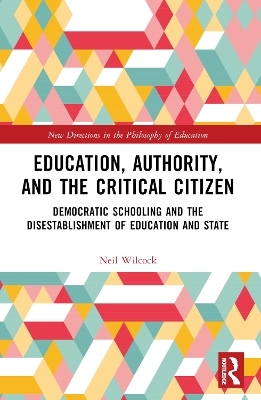
Education, Authority, and the Critical Citizen
Democratic Schooling and the Disestablishment of Education and State
Seiten
2024
Routledge (Verlag)
978-1-032-22271-4 (ISBN)
Routledge (Verlag)
978-1-032-22271-4 (ISBN)
- Lieferbar (Termin unbekannt)
- Versandkostenfrei innerhalb Deutschlands
- Auch auf Rechnung
- Verfügbarkeit in der Filiale vor Ort prüfen
- Artikel merken
With a strong focus on citizenship and the role of education in the development of social-justice oriented citizens, this book will be of great interest to researchers, academics, and postgraduate students in the fields of philosophy of education, political philosophy, educational theory, and citizenship education.
This book offers a unique analysis of the tension between the individual and society in educational contexts, and the role that citizenship and democratic education can play. It approaches the question from two different perspectives – the institutional and the interactional – and argues that any solution must answer the tension from both or it will necessarily fail. The answer is found through a political methodology that places education at the centre and concludes that a balance can be found if we embrace the federated disestablishment of education and state and internally democratic schooling that aims to realise the emancipation of the political child.
The book situates itself in the tradition of political philosophy that is education focused, identifying an unresolved tension between the individual and society in the works of Rousseau, Dewey, and Freire. It discusses the concept of authority as a primary issue persisting in this tension. It does so by exploring both interactional and institutional responses based on the idea of the free individual and cooperative associations. The author advocates an education system that creates the necessary space for the cultivation of the free individual and is run by the principles of internally democratic schooling.
With a strong focus on citizenship and the role of education in the development of social justice-oriented citizens, this book will be of great interest to researchers, academics, and postgraduate students in the fields of philosophy of education, political philosophy, educational theory, and citizenship education.
This book offers a unique analysis of the tension between the individual and society in educational contexts, and the role that citizenship and democratic education can play. It approaches the question from two different perspectives – the institutional and the interactional – and argues that any solution must answer the tension from both or it will necessarily fail. The answer is found through a political methodology that places education at the centre and concludes that a balance can be found if we embrace the federated disestablishment of education and state and internally democratic schooling that aims to realise the emancipation of the political child.
The book situates itself in the tradition of political philosophy that is education focused, identifying an unresolved tension between the individual and society in the works of Rousseau, Dewey, and Freire. It discusses the concept of authority as a primary issue persisting in this tension. It does so by exploring both interactional and institutional responses based on the idea of the free individual and cooperative associations. The author advocates an education system that creates the necessary space for the cultivation of the free individual and is run by the principles of internally democratic schooling.
With a strong focus on citizenship and the role of education in the development of social justice-oriented citizens, this book will be of great interest to researchers, academics, and postgraduate students in the fields of philosophy of education, political philosophy, educational theory, and citizenship education.
Neil Wilcock is an Honorary Research Fellow at Birkbeck College, University of London. His research interests have come to focus on the intersection between philosophy and educational theory. This has manifested as research into the methodology of political philosophy seen through the lens of education and allowed him to explore shared concepts within their framework, such as authority and freedom.
Introduction 1: Political Methodology 2 : The Critical Citizen 3: The Individual, Society and the Problem of Authority 4: The Institutional Structure of Education 5: The Interactional Structure of Education 6: Federated Disestablishment of Education and State 7: Internally Democratic Schooling. Conclusion. Index
| Erscheinungsdatum | 11.07.2023 |
|---|---|
| Reihe/Serie | New Directions in the Philosophy of Education |
| Zusatzinfo | 1 Halftones, black and white; 1 Illustrations, black and white |
| Verlagsort | London |
| Sprache | englisch |
| Maße | 156 x 234 mm |
| Gewicht | 453 g |
| Themenwelt | Geisteswissenschaften ► Philosophie |
| Sozialwissenschaften ► Pädagogik ► Allgemeines / Lexika | |
| Sozialwissenschaften ► Pädagogik ► Bildungstheorie | |
| ISBN-10 | 1-032-22271-9 / 1032222719 |
| ISBN-13 | 978-1-032-22271-4 / 9781032222714 |
| Zustand | Neuware |
| Haben Sie eine Frage zum Produkt? |
Mehr entdecken
aus dem Bereich
aus dem Bereich
Eine neues Menschsein für die Welt von morgen
Buch | Softcover (2023)
Vahlen (Verlag)
24,90 €
Einführung in die Theorie transformatorischer Bildungsprozesse
Buch | Softcover (2023)
Kohlhammer (Verlag)
34,00 €


